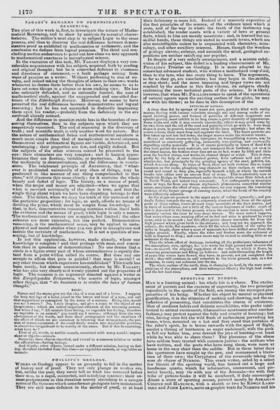TAGART'S REMARKS ON DEMONSTRATIVE REASONING.
THE plan of this work is, first, to investigate the nature of Mathe- matical Reasoning, and to show by analysis its essential charac- teristics. The author's next step is to subject Logic to the same process, and thus to discover the real difference between demon- strative proof as exhibited in mathematics or arithmetic, and the condusion we deduce from logical premises. The third and con- cluding section endeavours to point out how close we may approach to mathematical exactness in metaphysical science. In the execution of this task, Mr. TAGART displays a very con- siderable acquaintance with his subject, acquired both by reading and original thought ; but he is somewhat deficient in closeness and directness of statement, — a fault perhaps arising from want of practice as a writer. Without professing to aim at no- velty, and indeed taking the thoughts of others in their own words whenever he deems them better than his own, he seems to us to have set some things in a clearer or more striking view, lie has also rationally defended, and as rationally limited, the uses of mathematical study, against the exaggerated and one-sided doc- trines of the Edinburgh Review. Moreover, he seems to have perceived the real differences between demonstrative and logical reasoning ; but he has not succeeded in distinctly impressing them upon his reader,—probably from the deficiency in the ars soribendi already noticed.
And the difference in question exists less in the branches of rea-
soning themselves, than in the subjects upon which they are respectively exercised. The end of reasoning is the discovery of' truth ; and scientific truth is only another word for nature. But the nature of mathematical forms and mathematical numbers is much more simple than that of metaphysical or moral sciences. Geometrical and arithmetical figures are visible, determined, and unchanging; their properties are few, and rigidly defined. But the subjects of the other sciences cannot be presented to the eye: their characters are very complex; and to human appre- hensions they are fleeting, variable, or mysterious. And hence the uniformity in demonstrations, and the differences in conclu- sions. The celebrated principle of ARISTOTLE, that "what- ever is predicated universally of any class of things may be predicated in like manner of any thing comprehended in that class," will illustrate this more clearly; for it contains the whole beauty and defect of' logic. The beauty, as a means of' proof, when the major and minor are admitted—when we agree that what is asserted universally of the class is true, and that the single thing about which we have been disputing belongs to that class. The defect, when we deny the truth of the universal or of the particular proposition; for logic, as such, affords no means of deciding the point, which must be sought from knowledge. So that, in fact, demonstrative. reasoning contains within itself both the evidence and the means of proof, while logic is only a means. 'The mathematical sciences are complete, but limited ; the other sciences are more extensive, hut less perfect. Demonstrative reasoning, in the mathematical sense, may be applied to meta-
physical and moral studies when you can give to metaphysics and morals the certainty of mathematics. It is not a question of rea- soning, but of knowledge.
Is not this application, however, made already, where our knowledge is complete ? and that perhaps with more real convic- tion than in questions of demonstration? No one denies that a circle is a figure every part of whose circumference is equally dis- tant from a point within called its centre. But does any one scruple to affirm that pain is painful ? that man is mortal ? or any other truism which experience has established? This truth has been neatly, but almost unconsciously, shown by Mr. TAGART; who has also very clearly and tersely pointed out the properties of logic. The occasion is an argument directed against a writer in the Encycicioredia Britannica, who asserts of logic, amongst other things, that "its business is to evolve the laws of human thought."
LOGIC.
Nature and the senses give me the idea of a man and of a horse. I suppose the body and legs of a horse joined to the breast and head of a man and call that supposition or conception by the name of a centaur. Doing this, would you say I reason ? No, I only imagine, and give a name to the object of my imagination ; which are indeed important elements of the reasoning powers. But when I say, " All animals have feeling, no vegetable has feeling, therefore aro vegetable is an animal," you would say 1 reason; although from the very iabvit,usness of the words, and from their arrangement and the smallness of the effort of which we are conscious in following that arrangement, the poi, (ion of reason concerned, if tire could divide reason into measurable portions, is almost too insignificant to be worthy of the name. But if this be reasoning, what have we?
First of all, words, or audible sounds, associated with many seneible impres- sions or objects—animals.
Secondly, these objects classified, and viewed in a common relation or under the affiimation—having feelings.
And thirdly, other objects, viewed under a different relation, having no feel- ing, therefore excluded from this class—no vegetables animals, or vegetables no animals.


























 Previous page
Previous page